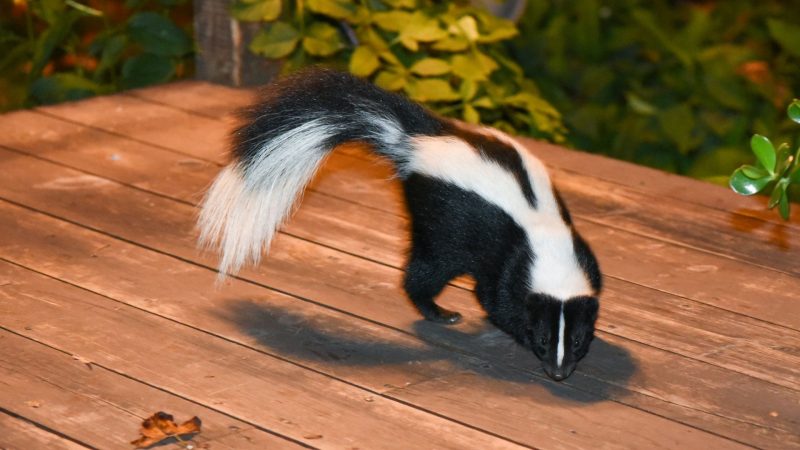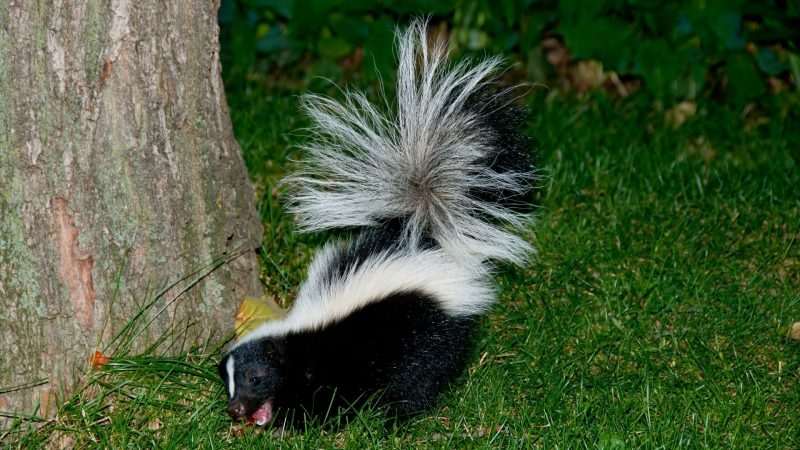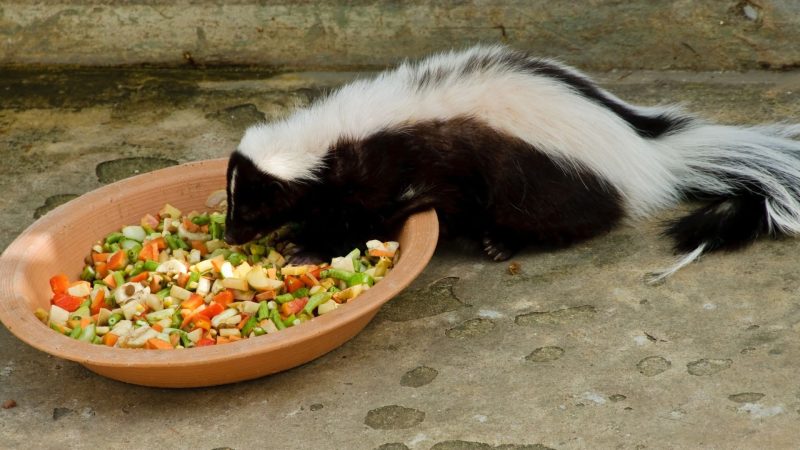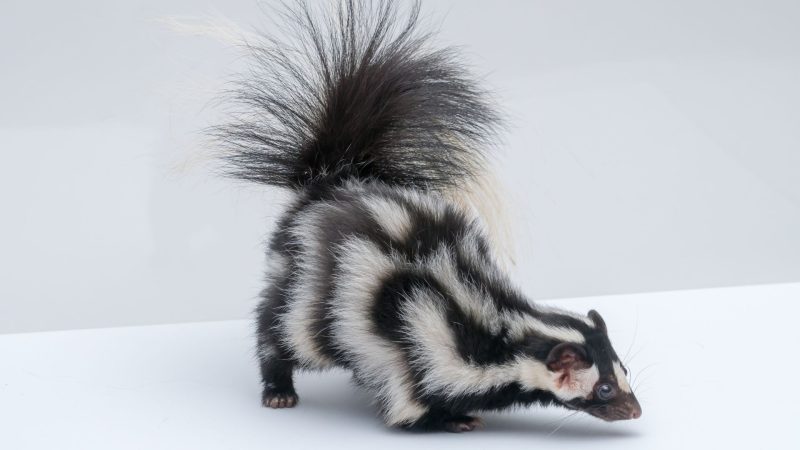A skunk smell is usually compared to the smell of tear gas. This is because both of them are lachrymators, which are chemicals capable of irritating the eyes, nose, and skin. Although skunks don’t really intend to harm humans, their unique foul smell can also enter your house, especially at night.
What does it mean when you smell skunk at night? It means that there is a skunk within your area. The stronger the smell is the closer the skunk. Skunks spray their very offensive odor mainly as a defense mechanism. They rarely enter houses, but you can still smell their spray even inside your home.
If you want to know more about skunks and their nighttime activities, what attracts them to your home, and in-depth information about their foul-smelling spray, simply read further this article!
Are Skunks More Active at Night?

Yes, they are nocturnal mammals. They sleep and rest during the day, and they come out shortly after sunset. However, you may also see a few of them in the daytime, as mother skunks or the pregnant ones sometimes go out to find a new den for their young.
What Time Do Skunks Come Out at Night?
There is no exact time that skunks come out at night. But once the sun comes down or when darkness prevails, they go out from their den and start doing their business. They will start coming back to their hideout shortly before sunrise.
How Do Skunks Behave at Night?

Most skunks cause damage by burrowing under buildings or porches. They also dig circular holes in soils, including lawns, gardens, and golf courses, to search for food insects.
Skunks tend to hide from humans, especially at night. They communicate with each other through screeching, squealing, and whimpering. However, they are usually quiet. You will only realize their presence once they release their unique skunk smell.
Why Do I Smell Skunk Every Night?
If you smell skunk every night, it only means skunks are near your house, and they are enjoying their stay. And unless you take some action, they will never leave. In fact, the skunk smell will go stronger as days go by if you ignore them. It only means that they are comfortable going closer to your house.
Related: How to Neutralize Skunk Odor | Tried and Effective
What Do Skunks Look For at Night?
Basically, skunks visit a neighborhood at night in search of food, water, and shelter. However, they are lazy enough to build a den. Instead, they usually use dens that were previously used by coyotes, foxes, and ground squirrels. Being opportunists creatures, they also eat birds, worms, lizards, grubs, and larvae.
What Attracts Skunks to an Area?

Skunks are very attracted to readily available food sources, including garbage and open garbage cans. Nevertheless, they are hypnotized by the smell of pet food. These shy animals are also very attracted to sunflower seeds and bird seeds. But aside from food, skunks will also go to your area if they see a good place to hide.
Why Does Skunk Spray Smell So Bad?
Contrary to earlier belief, skunk spray does not contain N-butyl mercaptan. Instead, skunks smell so bad because they have a chemical called thiol, which contains sulfur. It also has thioacetals, which slowly degrade the thiol to make it very stinky. This process is also what makes skunk smell last for a long time.
Skunks release their very unpleasant smell through their pair of anal glands. When they spray, these passive, shy animals turn around, form their backs like the shape of a horseshoe, lift their tail, and unload their spray. Amazingly, skunks are very good at aiming at their target, and their spray can reach up to 12 to 15 feet.
Do Skunks Only Spray When Scared?

Not necessarily. In general, skunks use their spray as their last resort to defend themselves. Once a human or a predator animal attacks them, they will try to escape. But if they get startled, cornered, threatened, or scared, skunks will automatically release their spray.
Do Skunks Show Warning Signs Before They Spray?
Skunks show warning signs before they spray. Aside from turning their backs at you, making a U shape, and lifting their tail, they also stomp their feet and growl like angry cats. But again, they will only spray if they get scared or feel threatened. Nonetheless, if you see those signs, run fast and as far as you can.
How Many Times Can a Skunk Spray in One Night?
Skunks can spray up to 5 or 6 times in succession or just one night, with a volume of about 15 cubic centimeters. However, they will not spray a lot if they are only mildly threatened. Once they run out of that oily liquid spray, they will need around 10 days before they can reproduce another supply.
Is It Bad to Breathe in a Skunk Smell?
It’s bad to breathe in skunk smell, especially if you have respiratory problems. Aside from eye and skin irritation, you may also experience stomach discomfort if you have inhaled their spray. The organic compounds in skunk spray smell worse than rotten eggs, enough to make you throw up.
How Long Does It Take for a Skunk Smell to Go Away?
You can still smell a skunk spray even if you are around 3.5 miles (5.6 km) away from the animal. In general, a skunk smell would last between 2 and 3 weeks if you will not treat it at once. If you act late, it will be harder for you to remove the odor because it will dry out and will stick on you and infected pets or objects.
What Are Skunks Good For?
Despite being destructive pests, skunks can be very beneficial to your yard. As omnivorous creatures, they also eat garden pests such as rats and mice. They are also fond of eating pest insects, including bees, beetles, crickets, wasps, grasshoppers, and even insect larvae. This is why you should not kill them.
What Should You Do (and Should Not Do) If You See a Skunk at Night?
Again, skunks are shy animals and rarely attack humans. Aside from eating garden pests, they are not really a cause for alarm. They will not bother you as long as you don’t bother them.
So if you see a skunk at night, here are some important things you should do and should not do to avoid them from spraying at you:
- Don’t panic and move away very slowly.
- Don’t make sudden movements or run away.
- Don’t speak or make a surprising sound.
- Try your best to distance at least 10 feet away.
- Provide some space so the animal can leave.
- Watch out for possible skunk spray.
- If the skunk is injured or cannot walk properly, call your local animal control immediately.
How to Prevent Skunks From Going Near Your House?

For the record, it’s easy to locate their dens since they also smell skunk. It’s also easy to deter skunks. Remember, skunks will only go near your house because they smell food and they feel safe. So if you think there’s a skunk den around, here are some effective ways to prevent skunks from going near your house:
1. Feed Your Pets Inside the House
Skunks are very attracted to pet food, so feed your pet dogs and cats inside your house, especially at night. If you feed them outside, don’t leave them unattended. Clean their bowls and don’t leave them outside with some food.
2. Empty or Cover Your Garbage Cans
Skunks are also great scavengers and will eat anything available. They may also forage for food in garbage cans. So if you cannot empty your garbage can before sleeping, cover the lids tightly. Also, never leave garbage bags near your door.
Related: What Do Skunks Eat In the Spring? | Information and Control Guide
3. Create Loud Noises
Skunks are afraid of loud noises and unfamiliar sounds. If you will use a radio, turn it to a very high volume and switch stations. However, skunks may get surprised and may spray. Try putting the source of sound on an elevated level.
4. Spread Strong Scents
Ironically, skunks hate some strong smells, and they avoid them. This includes citrus, mothballs with ammonia, and predator urine such as dog urine. Skunks also hate the smell of human urine because they treat humans also as predators.
5. Install Bright Lights
Being nocturnal creatures, skunks are very sensitive to light. Therefore, installing bright lights can also help deter skunks. And just raccoons and opossums, they are also scared of flashing lights because they think of them as predators.
6. Protect Your Livestock
If you have poultry, headless chickens, and missing eggs may be due to a skunk attack. Therefore, make sure your chicken coop is skunk-proof and is properly closed at night. Nevertheless, skunks prefer eating young chickens over mature ones.
7. Cover the Holes on the Ground
Skunk dens are usually at least 2 feet deep and have an opening of 4 – 8 inches in diameter. If you see holes of this size in your yard, chances are skunks are living with you. Cover the holes using chicken wire or fill them with soil or leaves.
8. Eliminate Plant Pests
As mentioned earlier, skunks love digging soil and eating garden pests. Although they help you maintain your garden, you are also inviting them. Therefore, you might want to spray beneficial nematodes or organic pesticides on your plants.
9. Build Fences
Skunks are not great climbers, so you only need to build a fence that is around 3 or 4 feet tall. But because they are good at digging, bury the fence at least 1 foot deep. If you prefer using electric fences, make sure it won’t kill the skunks.
Related: How to Get Rid of Skunks Without Killing Them? | A Complete Guide
List of Sources
Commonwealth of Massachusetts. (n.d.). Learn About Skunks.
Iowa State University. (n.d.). Skunks: Damage Management.
Thurston, S., & Brittingham, M. (2006). Skunks – Solutions to Common Problems. The Pennsylvania State University.
- How to Get Rid of Cockroaches? | Proven Strategies & Solutions! - June 24, 2023
- Powerful Homemade Wasp and Bee Sprays (with Recipes) - March 4, 2023
- Crazy Ants Invasion | Eradicate & Prevent Unwanted Guests - February 24, 2023
